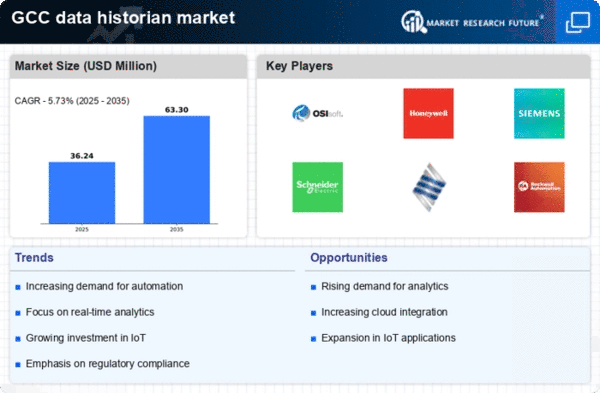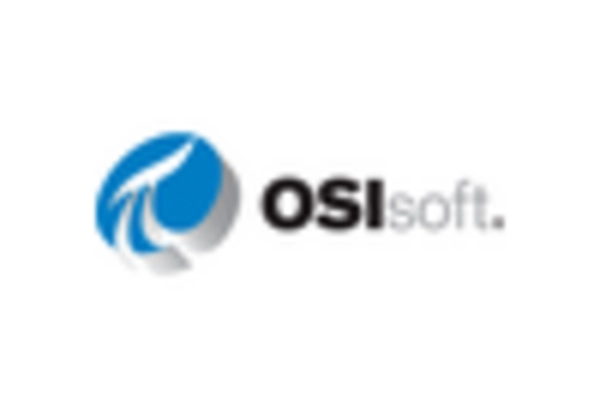Adoption of Cloud-Based Solutions
The shift towards cloud-based solutions is significantly impacting the data historian market. In the GCC, organizations are increasingly migrating their data storage and analysis processes to the cloud, driven by the need for scalability and flexibility. This transition is expected to result in a market growth of around 20% over the next few years. Cloud-based data historians offer advantages such as reduced infrastructure costs and improved accessibility, enabling organizations to analyze their historical data from anywhere. As businesses continue to embrace digital transformation, the demand for cloud-based data historian solutions is likely to rise, reflecting a broader trend towards cloud adoption in various sectors. This evolution is poised to redefine how organizations manage and utilize their historical data.
Emergence of Predictive Analytics
The rise of predictive analytics is reshaping the landscape of the data historian market. Organizations in the GCC are increasingly utilizing historical data to forecast future trends and behaviors. This capability is particularly valuable in sectors such as manufacturing and energy, where predictive maintenance can lead to significant cost savings. The market for predictive analytics is anticipated to grow by approximately 15% in the coming years, driven by the need for proactive decision-making. Data historians serve as the backbone for these analytics, providing the necessary historical context for accurate predictions. As businesses seek to enhance their operational strategies through data-driven insights, the data historian market is likely to expand in response to this growing demand for predictive capabilities.
Increased Investment in Industrial IoT
The integration of Industrial Internet of Things (IIoT) technologies is significantly influencing the data historian market. In the GCC, industries are investing heavily in IIoT solutions to enhance operational efficiency and data collection processes. This investment is expected to reach approximately $5 billion by 2026, indicating a robust growth trajectory. Data historians play a crucial role in this ecosystem by aggregating and analyzing data from various IIoT devices, enabling organizations to optimize their operations. The ability to monitor equipment performance and predict maintenance needs through historical data analysis is becoming increasingly vital. Consequently, the data historian market is poised for substantial growth as more companies adopt IIoT strategies to remain competitive in their respective sectors.
Rising Demand for Real-Time Data Analysis
The data historian market is experiencing a notable surge in demand for real-time data analysis capabilities. Industries across the GCC are increasingly recognizing the value of immediate insights derived from historical data. This trend is particularly evident in sectors such as oil and gas, where operational efficiency is paramount. According to recent estimates, the market for data historians in the GCC is projected to grow at a CAGR of approximately 12% over the next five years. This growth is driven by the need for organizations to make informed decisions quickly, thereby enhancing productivity and reducing downtime. As companies seek to leverage data for competitive advantage, the The market is likely to expand significantly, reflecting the critical role of real-time analytics in modern business operations.
Growing Focus on Data Security and Privacy
As organizations in the GCC become more data-driven, the emphasis on data security and privacy is intensifying. The data historian market is responding to this trend by incorporating advanced security features to protect sensitive information. With the implementation of stringent data protection regulations, companies are compelled to ensure compliance while managing their historical data. This shift is likely to drive the adoption of data historian solutions that offer robust security measures, including encryption and access controls. The market is expected to witness a growth rate of around 10% as businesses prioritize safeguarding their data assets. This focus on security not only enhances trust among stakeholders but also positions organizations to leverage their data more effectively in a secure environment.
















